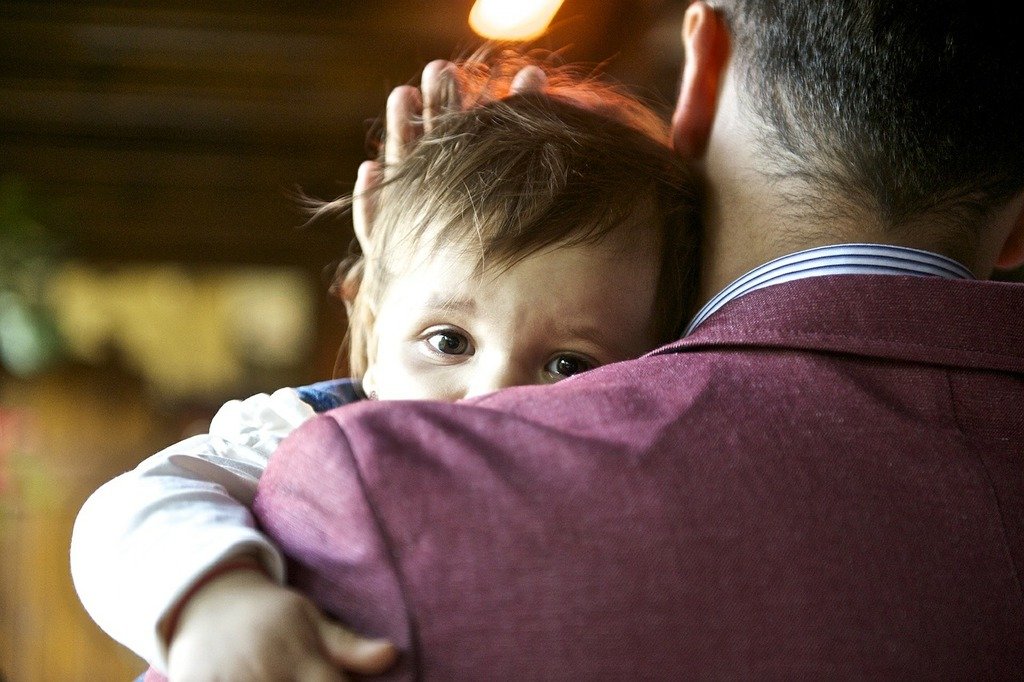

A new study reveals what evolutionary biology can—and can’t—illumine about fatherhood
Father Time: A Natural History of Men and Babies by Sarah Blaffer Hrdy. Princeton University Press, 2024. 432 pp., $29.95
Before I became a father very few movies or TV shows made me cry. Sure, It’s a Wonderful Life, The Passion of the Christ, a Terrence Malick film, or maybe a few episodes of Doctor Who could cause me to tear up, but that was the extent of it. But starting two-and-a-half years ago, when I first felt my oldest son moving in my wife’s womb, I haven’t been able to keep my eyes dry during any remotely touching movie—and even some saccharine car commercials.
What happened? Motherhood changes a woman’s body and mind quite dramatically, but what about the changes that fatherhood brings about for men? This is the question that Sarah Blaffer Hrdy, a renowned anthropologist and primatologist, wife and mother of three, investigates in her new book Father Time: A Natural History of Men and Babies.
This book is a welcome addition not just to popular scientific literature about parenting but also to the growing number of books examining masculinity. Two recent books, one from the left (Of Boys and Men by Richard Reeves) and one from the right (Senator Josh Hawley’s Manhood: The Masculine Virtues America Needs) have received significant attention, while books like Jack Donovan’s The Way of Men hold great sway among young men disaffected with contemporary culture. The Art of Manliness series is a staple Christmas gift for young men, while Harvey Mansfield’s Manliness—though nearly two decades old now—still provides readers with a thoroughgoing academic interrogation of manhood.
This spate of books did not come out of nowhere. It has become abundantly clear in recent years that men and boys, on the whole, are not well. Whether looking at tragedies like school shootings and suicide rates or low educational attainment and failure to launch, the plight of men (especially young men) is today acknowledged by all but the most ideologically siloed. The fact that 91.5% of male respondents in a 2018 study reported viewing pornography in the previous month—and that this statistic made few headlines—tells much about the poor state of men in the United States today.
One way that men in the U.S. have traditionally developed socially, economically, and morally is through lifelong, monogamous marriage. In the American mind, marriage involves a man settling down, taking on responsibility, and maturing. Yes, there are those on the left who see marriage as a harmful patriarchal institution, and there is a growing number of people on the right who, like Pearl Davis, argue that contemporary marriage law and our feminist culture both disadvantage men, and they are better off with live-in girlfriends. Still, most of us continue to see marriage as a positive institution in society. We recognize fatherhood in particular as something that helps men to grow and better serve their communities and the world.
In Father Time, Hrdy studies this function of fatherhood through her expertise in evolutionary anthropology. Her reasons for writing this book are quite personal. Indeed, the book—despite its proclivity towards nearly overwhelming technical detail—is written in part as an autobiography. In the first chapter she recalls the first time she saw a man “totally immersed in nurturing a baby”—her son-in-law, David. She had warm and fuzzy thoughts and feelings “as a mother and grandmother,” but she explains that soon this image began to raise questions for her as a scientist. Over the course of her professional life she had been taught to view human males as basically incapable of and uninterested in caring for young. Was this phenomenon of nurturing fathers as unprecedented as both her personal life and her professional training had led her to believe? And if not, where might we look for practices that might illuminate the changing role of fathers?
After nearly a decade of research, Hrdy has concluded that the move in the West towards very involved fathering is tapping into ancient, profound aspects of men’s biology and psychology. In order to understand just how she makes this argument, readers need to recognize that the key descriptor of the book’s title, Father Time: A Natural History of Men and Babies is unequivocally the phrase “A Natural History.” Despite its breezy style and autobiographical anecdotes, the book is not light reading: It is a rigorous consideration of the myriad ways animals and humans parent, and of everything that goes along with that. The book is filled with extensive scientific detail—such as descriptions of the fertilization of various fishes’ eggs, the carnivorous instincts of mice, the genitalia of bonobos, and the vocal sacs of South American frogs.
These detailed discussions are both a strength and a weakness of the book. Hrdy’s mastery of the social, sexual, and parental habits of myriad species can make it difficult to separate the line between careful description of animals and prescriptive advice for human parents—and, crucially, to consider whether there are any logical jumps to which we ought to object. This means the book is best approached in a slow, methodical way, weighing the usefulness of each report about animal and human behavior.
Take, for instance, her several discussions of the ways that polyandrous mating can help, in some species, to protect vulnerable young. Yes, they’re interesting, but what does Hrdy want us to conclude from them? Hrdy is convinced that human babies evolved to be reliant on more than just their mother. Fair enough; western parenting since the industrial revolution has been unduly focused on the nuclear family. Children—and parents—tend to fare best if supported by a wide network of familial and communal relations. This is something on which Hrdy and I agree.
We part ways over how people (and governments) should respond to recent developments, such as divorce rates, in vitro fertilization, and blended families. I think that older ethical modes of thought, especially those inherited from ancient Greeks and early and medieval Christians, are crucial to navigating this brave new world. By contrast, Hrdy tends to disregard such traditions, championing recent developments as opportunities for the supposed emancipation of women.
I take little joy in criticizing Professor Hrdy’s work, as we share many of the same concerns. But as readers work their way through Father Time, it becomes very clear that Hrdy allows her frustrations about contemporary politics to disfigure her otherwise exquisite scholarship. In the middle chapters of the book she is the model of objectivity, as she, for instance, describes the habits of non-Western tribes that maintain traditional ways of life, even those that cause patent harm to the people living in accord with them. However, as the book reaches its climax and she turns her attention to the contemporary West, she begins to show anger and sometimes even vitriol towards those who maintain what she perceives as insufficiently progressive family structures—especially those who do so in part because of their Christian beliefs. In other words, much of the book’s ending is a polemic against men (and fathers) like me.
This turn in a work of contemporary scholarship may not be surprising, but it is disappointing. By the end of the book, Hrdy seems to forget that she is not writing a sermon for those who already agree with her. For Hrdy, all hesitation about recent social developments is summed up by the trite line that “For those used to privilege, greater equality can feel like oppression.” She has little respect for anyone who disagrees with her vision, explicitly equating things like opposition to abortion with racism and misogyny.
Over the course of the book, she gives some hints of what she experienced as a woman in graduate school at Harvard in the 1970s. I am sure that Hrdy has seen—and experienced—sexism in action. These experiences will—and should—color one’s perception of the world. But in the last two chapters, as she attempts to paint a picture of the ways intensive fathering can positively impact the world, her descriptions become, frankly, risible. She seems incapable of recognizing any positive additions “manly” men can make to society, seeing everything frightening and harmful in the world as a result of patriarchy.
For Hrdy, American political and social life is fundamentally tainted by patriarchy. The best of American politics comes either from women or from men who do not allow testosterone to impact their reasoning. She hopes that as more and more fathers become deeply involved in their children’s lives, the changes they undergo will serve to pacify them, and that this will affect ways of life, voting patterns, and governance. She holds up women’s peaceful, natural tendency towards caring and nurturing as central to healthy political life.
I am at risk of caricaturing Hrdy’s views here given our disagreements, but I believe I am reading her as she intended. In her view, virtually all conflict arises from patriarchy and testosterone. Women—especially mothers—are thus the ideal political actors, and Hrdy legitimizes male participation in politics by saying that they can become more like women. Some ancient philosophers erroneously imagined women to be best understood as defective men. In a reversal of this, Hrdy seems to view men as defective women, and she accordingly advocates for the deliberate suppression of much of what, to my mind at least, is distinctive about men.
By contrast, I believe we can applaud the move in recent decades towards fathers being more present in their children’s lives without attempting to cover over the distinctive gifts that fathers often bring—yes, even those gifts spurred by testosterone. Equating traditional notions of masculinity with rape, nuclear war, and resentment of women is not only historically myopic, it ultimately serves only to exacerbate the divisions we face today.
Despite the many deep and abiding disagreements I have with some of Hrdy’s assumptions and conclusions, much of her book is illuminating and intriguing. I am glad to see an academic of her caliber turning her attention to the topic of fatherhood as a sphere of nurturing. I may wish the book had been more open-minded and less predictable in its conclusions, but upon finishing Father Time, I am left with a profound gratitude for the ways that my two sons are helping me grow as a man. Now, if you’ll excuse me, my son wants to watch The Muppets, and I need to get the tissues.
Felix James Miller serves as senior editor at The European Conservative and a co-host of the podcast Truth, Beauty, Comics! (beginning July 2024). He is a Ph.D. candidate in philosophy and lives with his wife and two sons in the shadows of the Adirondack mountains. Twitter: @FelixJMiller
Image: Picryl
“The fact that 91.5% of male respondents in a 2018 study reported viewing pornography in the previous month—and that this statistic made few headlines—tells much about the poor state of men in the United States today.”
How very Puritan a perspective.
There was another spot where the reviewer explicitly argued for the vital centrality of ancient Greek and medieval Christian philosophies of parenting and masculinity. That’s weird. Why these philosophies? This looks like a cultural bias produced by the reviewer’s embeddedness inside a Judeo-Christian Platonism common to Europe and parts of America. If he were a Hindu or Muslim would he be arguing for the vitality of caste or Ottoman insights into what it means to be male?
It felt like the reviewer was trying to be polite and constructive in the places where the book fell short by quite a bit, but ended up by trying to substitute his biases and preferences in those places where the ideological feminism of the author distorted her perspective or argument. Literally mansplaining masculinity to a female scholar of masculinity… or mansplaining to a womansplainer.